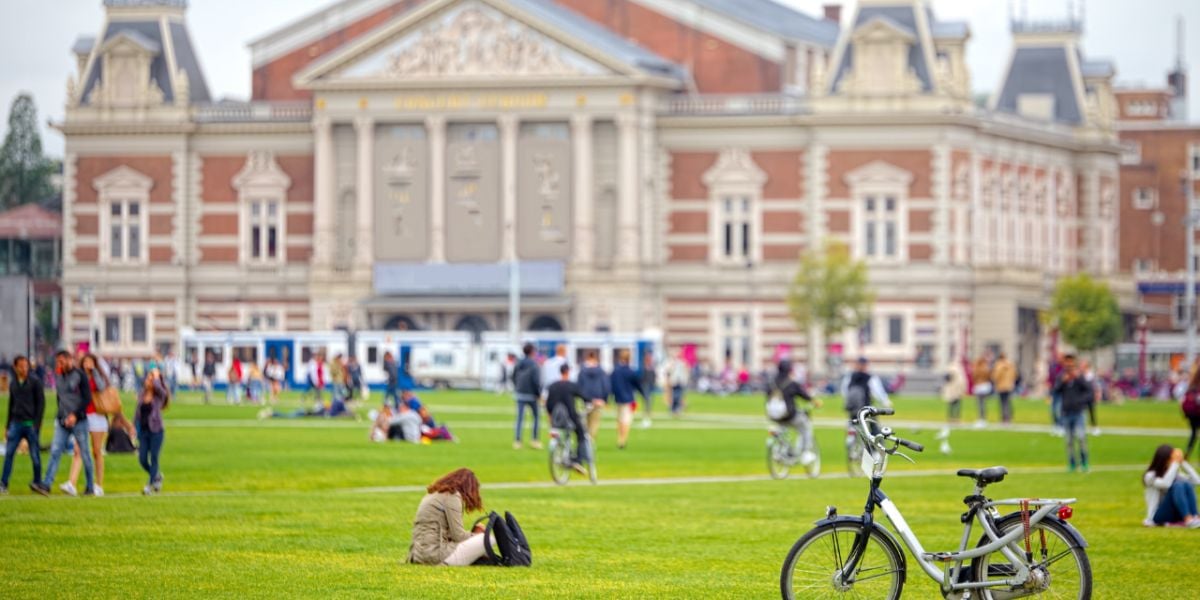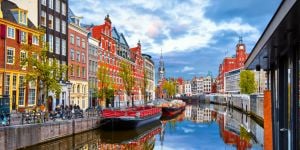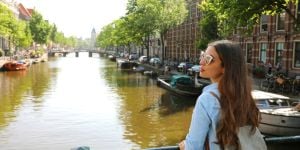
If you want to pursue higher education in Amsterdam at a publicly funded research university, then you have two choices: the University of Amsterdam and Vrije Universiteit Amsterdam (Free University of Amsterdam). The former enrolls around 41,000 students a year (around 5,000 are international), and the latter enrolls around 31,000 students a year (over 5,000 are international). But t
Considering over 1.1 million people live in Amsterdam, this means around 10% of the city's population is students. Below, we'll explore the details of each university so you can see if they're right for you.
The University of Amsterdam (or UvA)
This university was founded in 1632 and is the third-oldest university in the Netherlands, as well as the largest. Some of their notable alumni include six Nobel Prize winners, most notably Aletta Jacobs, who was the first female physician in the Netherlands.
The University of Amsterdam has over 3,000 faculty members, 14 English bachelor's programs, and 53 English master's programs. There are around 150 degree programs taught in English. As of 2024, it's ranked 53rd among the Top Universities in the World. You can find a number of different subjects to study at this university, but their strengths are arts and humanities and social sciences.
UvA is also recognized as one of Europe's biggest research universities. Many scientific publications come out of this university, as it gets excellent research funding. At its library, there are over 4 million books and manuscripts. You'll even find five museums at the UvA.
Unlike traditional universities, UvA doesn't have a central campus. Instead, you can find several of them scattered throughout the city center. For example, you'll find the Faculty of Science in Science Park on the east side of the city and the Medical Center in the south. Going to UvA can be a great way to learn the ins and outs of Amsterdam.
Over 28,000 students attend this university every year for their bachelor's degrees, and over 9,000 of them are international students. They come from 100 different countries in the world. You'll be able to get housing in Amsterdam through the UvA.
Activities at UvA
UvA students know how to have great social lives. From student life and sports to creative arts and media, they have student associations for a wide variety of interests. Most of them throw unforgettable parties, so your social life won't be lacking. Some examples include the Amsterdam Student Society, Cyclades, L.A.N.X., MoNoMes, and SSRA.
There are also several international student associations you can join if you need help adjusting to Dutch life as an international student. Not only will they assist you with settling in, but they'll also help you connect with Dutch students to learn more about their culture.
How to enroll at UvA?
Depending on which subject you are interested in, there will be different application deadlines, so be sure to check these once you've decided on your area of study. Other important things to check are their language and prior education entry requirements; if you don't meet them, your application won't be accepted.
The tuition fees you pay at UvA will depend on whether you're an EU/EEA, Swiss, or Surinamese citizen. If you are, tuition fees will be around €2,000 a year (for 2024, it's €2,530). If not, then it'll be upwards of €8,700, depending on which subject you pick. First-year students previously enjoyed 50% off their tuition fees. However, this is no longer the case.
Do note that you have to pay a non-refundable €100 application fee. However, if you're a Dutch or Surinamese citizen, or if you've got your international diploma in the Netherlands, already applied for another program at the university in the last year, are an exchange student, are applying through the Foundation for Refugee Students (UAF),are an EEA citizen who has or will get an International Baccalaureate (IB) and your program is part of the IB pilot, then you won't have to pay this application fee.
Vrije Universiteit Amsterdam (Free University of Amsterdam, or VU)
Unfortunately, “vrije” doesn't mean this university is free of charge. Instead, it means that the university is free from the church and the state. Back when it was founded in 1880, Neo-Calvinist Abraham Kuyper lectured at the university, which meant many of the courses were Christian-based. But once VU became public in 1968, pretty much all religious teaching material disappeared.
Today, VU is the second-largest university in the country. You'll find the main campus in the southern part of Amsterdam, as well as a satellite campus in Amstelveen. They offer 45 bachelor's programs and around 100 master's programs. Their stronger points are religious studies and exchange programs with other international universities.
There are nine faculties, and almost 32,000 students enroll every year, with over 5,000 of them being international ones. You'll be able to get student housing in Amsterdam through VU.
Activities at VU
Like with UvA, student life at VU is lively and abundant. They have plenty of student associations to join, including several ones for international students. There are two types: study and student associations. As the name suggests, study associations are for studying, and you can get discounted books through these groups. There's no hazing involved. On the other hand, student associations are more for making social connections and partying, so you'll meet students from all walks of life. While there's hazing involved, you won't have to worry about anything too extreme, as there are strict laws and regulations surrounding these events.
If you need further help with things such as housing, visas, residence permits, bank accounts, or even pick up from Schiphol Airport, you can seek out the International Office. You can always drop by the Global Room in the Main Building (HG-1A36), or you can contact them online as well.
How to enroll at VU?
Like with UVA, you need to check the application deadlines and admission requirements for VU to ensure you meet them for your desired school year. Every degree program has its own admission rules and requirements, so be sure you check directly with your department to get the correct information for admission.
Tuition fees are the same across all Dutch universities. This means if you're an EU/EEA, Swiss, or Surinamese citizen, then tuition fees will be around €2,000 a year at VU. If not, then it'll be around €8,000 or more.
Vocational training in Amsterdam
There are also schools for vocational training in the Netherlands called hogescholen. There are a few located in Amsterdam, and you can earn bachelor's degrees at these universities too. Here are the ones you'll find in Amsterdam.
Amsterdam School of the Arts
The Amsterdam School of the Arts (Amsterdamse Hogeschool voor de Kunsten, or AHK) actually has six different institutes.
The first is the Conservatorium van Amsterdam (CvA), which specializes in music; classes are in both English and Dutch. This is actually the largest conservatory in the nation, and you'll find it next to the Concertgebouw. This university teaches all sorts of music, and you can get both a bachelor's and master's degree here. While there's a maximum age limit of 30 for students, there are some exceptions where you can study by contract if you meet all the requirements. However, do note that you won't be able to get housing through this school.
The next institute is the Amsterdam Academy of Architecture. As you'd expect, you'll learn about architecture, spatial sciences, building and civil engineering, landscape architecture, and urban design. You can only get a master's degree here, and classes are taught in English and Dutch. You need to also work for at least 20 hours a week in a relevant position (minimum of 840 hours), but once you graduate, you have a direct entry to the Register of Architects. There's no student housing available here.
The third institute is the Academy of Fine Arts (or Breitner Academy), where you'll get the Teacher of Fine Arts and Design diploma when you're finished. This diploma is valid throughout Europe, so that'll be useful if you move in the future. Subjects you'll learn here include theory of the arts, visual arts, and didactics. Unfortunately, classes are taught only in Dutch here, so only international students with a good grasp of the language can apply.
The fourth institute is the Netherlands' Film Academy. Subjects taught here include sound design, screenwriting and editing, cinematography, production design, fiction directing, documentary directing, and interactive multimedia/visual effects. Like the prior institute, you must know Dutch to enroll, as all classes are taught in this language.
The fifth institute is the Academy of Theatre and Dance; its classes are also all taught in Dutch. It'll take you an average of four years to complete its courses in theater, theater technology, dance, and production. You'll need to go through an admission procedure for each course, as the institute wants to be selective in talent. You'll find a black box theater here, as well as a dance theater, cabaret theater, and performance studios.
Lastly, you have the Reinwardt Academy, which is for museology studies. If you don't know Dutch, then you won't be able to enroll in the bachelor's program, as it's all in Dutch. However, if you're pursuing a master's degree, then you'll be pleased to know that classes are taught in English here.
Gerrit Rietveld Academie Amsterdam
If you're interested in the fine arts, then enrolling in Gerrit Rietveld Academie Amsterdam can be a good idea. The classes are taught in English. You can only get a bachelor's degree at this academy; classes are held during the day and the evening, and it'll take you four years on average to graduate. Subjects include photography, graphic design, jewelry, visual arts, fashion design, textile, and more.
To get into this academy, you need a secondary education diploma. However, don't let this discourage you if you don't have one. If you have exceptional talent, then the school may waive this requirement for you. Either way, you need to send in your portfolio and also take an entry exam.
There's no student housing available at Gerrit Rietveld Academie Amsterdam.
IC University of Applied Sciences - Amsterdam
This university is ideal if you like hands-on education and you want to go into business. Here, courses comprise trips to companies, seminars, and other educational trips. You'll also get the chance to take on internships as well.
What's fantastic is the teachers at this school are actual entrepreneurs, so they have first-hand experience. You'll get the opportunity to ask them all your burning questions and learn from successful business people.
Hogeschool IPABO
IPABO has facilities in both Amsterdam and Alkmaar. You should enroll in IPABO if you want to become a teacher, as this is the school's specialty. They have full-time bachelor's courses for this. It should take you four years to complete your studies, and you'll get an internship to practice your skills at schools while you're studying.
Considering that you'd be a teacher in the Netherlands, it then makes sense that you need to have a good grasp of the Dutch language. For this reason, you need a diploma for Dutch as a Second Language (NT2) at level 2.
Once you graduate from IPABO, you can use the school's cooperation with other hogescholen to get your master's if you wish, such as at VU. So this school sets you up for success right away.
Preparing for student life in Amsterdam
Every university will have its own requirements, and within each course, there are even more entry requirements. Make sure you fully understand these before applying, and note when the application deadlines are. You'll also want to double-check you've got the right language skills and certifications if necessary.
If you're finding it tough to get together money for university, then look for a scholarship. If you're an EU/EEA citizen, then you're eligible for student financial services.
Most importantly, research visa requirements for the Netherlands and apply for one well in advance if you need one. If needed, apply for your residence permit as well.
Housing is tough to find in all of the Netherlands, but especially in Amsterdam. But don't try to book accommodation before you arrive in Amsterdam unless you've arranged it through your university. Unfortunately, many shady landlords and scammers take advantage of the desperation for housing and will take people's money without an actual housing contract in return. So it's best to be in the country to have physical viewings.
We do our best to provide accurate and up to date information. However, if you have noticed any inaccuracies in this article, please let us know in the comments section below.








